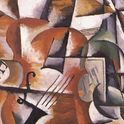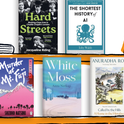The Birthday Party by Laurent Mauvignier, tr. Daniel Levin Becker (Fitzcarraldo Editions)
A night of terror befalls the residents of an isolated hamlet deep in the French countryside. Patrice Bergogne has planned a celebration for his wife Marion’s 40th birthday—the two of them, their daughter Ida and their neighbour Christine (an artist who lives next door)—unaware that some uninvited guests are also on their way. Mauvignier leaps between the streams of consciousness of each of his characters, ratcheting up the tension at an almost unbearable pace. His prose is never anything less than propulsive as the threat looms ever closer, but, at the same time, he keeps us waiting, teasing us with the promise of an outbreak of horrifying violence.
Brian by Jeremy Cooper (Fitzcarraldo Editions)
Brian lives in London’s Kentish Town, works for Camden Council, and lunches at the same café every day. But a chance visit to the British Film Institute expands his world. Soon he’s visiting the cinema on the South Bank every night, working his way through celluloid history, exploring new continents and cultures by means of an array of international films, and inhabiting a thousand lives different to his own. Somewhere between a novel and a work of film criticism, Cooper’s book is a celebration of the amateur enthusiast, and a reminder of why we all need art in our lives.
Forbidden Notebook by Alba de Céspedes, tr. Ann Goldstein (Pushkin Press)
First published in Italy in 1952 and written by one of the country’s then most successful and widely translated authors—de Céspedes was an Italian-Cuban anti-fascist novelist, poet and screenwriter—but out of print for decades, this electric novel in diary entries explores one woman’s discontent in post-war Rome. Marking something of a mid-point between Virginia Woolf—de Céspedes’s 43-year-old narrator, a wife and mother of two nearly grown-up children, longs for “a room of my own”—and contemporary confessionals from the likes of Sheila Heti, Deborah Levy and Rachel Cusk, Forbidden Notebook is the story of an illicit love affair between a woman and her own newly awakened psyche.
The Fraud by Zadie Smith (Penguin)
Set in Victorian London, Smith’s rambunctious and riotous tale braids fact and fiction with delicious effect. She takes a host of real-life figures—from Charles Dickens to the Tichborne Claimant, a butcher from Australia who claimed he was the heir to an English baronetcy (a man presumed to have been lost at sea many years before)—and unites their stories by means of one Mrs Eliza Touchet, the housekeeper of the now all-but-forgotten novelist William Ainsworth. As far as I’m concerned, it’s Smith’s best novel in years. The fun she’s having with her material is obvious, but the book’s more melancholy moments resonate deeply too.
Love, Leda by Mark Hyatt (Peninsular Press)
This is a fascinating discovery: a lost novel, never before published, set and written in the mid-1960s by a queer, working-class writer who was writing candidly about gay sex before the Sexual Offences Act of 1967. It’s also a wonderful portrait of the various nooks and crannies of Swinging Sixties London. Think an urban picaresque in the style of Rosemary Tonks’s The Bloater (which itself was republished last year to much acclaim), but dirtier—in all meanings of the word.
My Death by Lisa Tuttle (NYRB Classics)
This is the story of a writer working on the biography of an older female writer and artist whose own achievement and talent were long eclipsed by the fame of her older male lover (whose muse she was). But as the two women spend more and more time together, the boundaries between them begin to disintegrate, and the narrator finds herself wondering whose story she’s really writing. At barely 100 pages, this one packs a punch well above its weight. It’s both a creepy ghost story and a haunting meditation on the uneasy relationship between writers and their subjects.
Ordinary Human Failings by Megan Nolan (Jonathan Cape)
This, the young Irish writer’s second novel, is firm proof that the success of her debut, Acts of Desperation, was no fluke. Nolan draws us in by means of a lurid crime—the possible murder of a 3-year-old child by her 10-year-old playmate on a South London housing estate in the 1990s—only to unfurl a tale of the shame, struggle and failure that’s dogged the members of a reclusive family of Irish immigrants. As each of the clan’s stories are developed in turn, the tighter the web of trauma and pain that envelops them all becomes. Nolan’s keen powers of perception and portrayal are matched by her mercy and compassion.
Study for Obedience by Sarah Bernstein (Granta)
A woman travels north to become housekeeper for her brother, who lives deep in the countryside in a land that once was home to their ancestors. She doesn’t speak the locals’ language, but she’s well aware of the air of menace and hostility that descends around her. Animals in the vicinity begin to fall sick and die; there’s a potato blight; mothers cover their children’s eyes when she approaches. A runner-up for this year’s Booker Prize, this deeply unsettling, beautifully written, parable-like novel is one I’ll be thinking about for a long time.
Tom Lake by Ann Patchett (Bloomsbury)
Set during the pandemic on a cherry farm in Michigan, a woman enthrals her three grown-up daughters by finally telling them the full story of her doomed first love—a summer fling with a now super-famous actor whom she met when they were both just starting out in the industry, starring in a production of the play Our Town. It’s pure pleasure from start to finish—the kind of novel one sinks into with an inaudible sigh of relief, knowing that one couldn’t be in better hands.
Vengeance is Mine by Marie NDiaye, tr. Jordan Stump (McLehose Press)
This gripping psychological thriller about guilt, culpability and justice might just be my favourite book of the entire year. An acclaimed writer in her native France, Marie NDiaye’s work deserves to be far better known here in the UK than it is. A 42-year-old female lawyer takes on the case of a mother who has drowned her three children. But it’s her client’s husband whom she’s more preoccupied by, believing she encountered him during her childhood; if only she could access the full memory. Haunting in more ways than one, it’s a strange and chilling tour de force.












